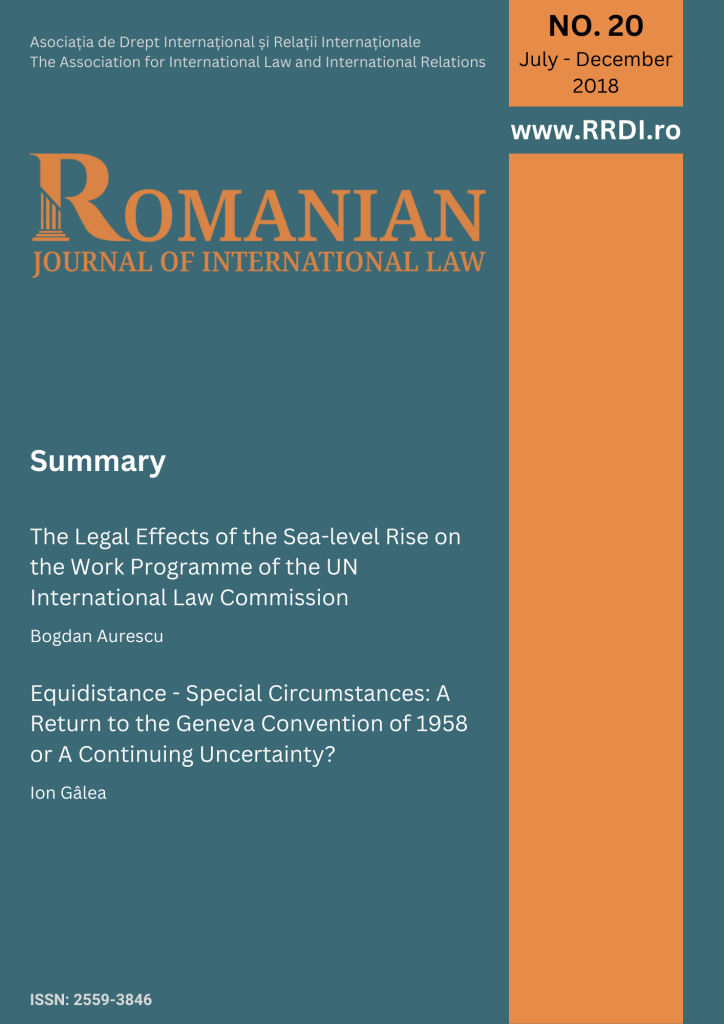Equidistance – Special Circumstances: A Return to the Geneva Convention of 1958 or a Continuing Uncertainty?
Ion GÂLEA
Since the date of 3 February 2019 marks the 10th anniversary of the judgment of the international Court of Justice in the Maritime Delimitation in the Black Sea (Romania v. Ukraine) case, the study proposes an analysis of the relevant case-law in the field of maritime delimitations, in order to ascertain the existence of a trend towards the consecration of the ”equidistance – special circumstances” as the most pertinent method for international courts and tribunals, to effectuate maritime delimitations. The study demonstrates that the Black Sea case has been a turning point, which established, as a matter of ”acquis judiciaire”, that the equitable result envisaged by the relevant law (articles 74 and 83 of UNCLOS, reflecting customary international law) is to be achieved by the use of the ”equidistance – special circumstances” method (except for ”compelling reasons”). The line of cases which started with the Black Sea delimitation provided, as a matter of legal certainty, the predictability that this method will be used in the application of articles 74 and 83 of UNCLOS. However, the study shows that certain difficulties persist with respect to the ”way in which” the method will be applied, especially in the light of certain special circumstances, such as ”concavity” or ”cut-off effect”.
Migration by Sea – Current Challenges in International Law
Elena LAZĂR
Migration by sea represents a topic that brings to attention controversial issues, mostly due to the difficulty of achieving the right balance between the two interests at stake- assuring the security and integrity of borders and respecting the rights of irregular migrants that travel by sea. Another challenge and quite a delicate issue is related to the fight against terrorism in the context of recent migration crisis from the past few years. This paper aims to provide on one hand the framework picture of the international legal instruments that deal with this topic in order to emphasize their potential flaws and on the other hand to briefly analyze the bilateral agreements concluded by States in order to better deal with the migratory flow.
L’Interaction entre le Droit de la Mer et la Convention Européenne des Droits de l’Homme
Carmen-Gina ACHIMESCU
L’interaction entre le droit de la mer et la Convention européenne des droits de l’Homme a été analysée pour la première fois en début des années 2000. De nouveaux défis sont apparus depuis, l’analyse de la jurisprudence plus récente de la Cour de Strasbourg révélant une diversité extraordinaire de situations où droits de l’homme et droit de la mer se rencontrent. Quoique le rencontre entre droits de l’homme et droit de la mer ne soit bouleversant pour aucun des deux domaines, l’objectif de la présente étude est de trouver un fil conducteur dans la jurisprudence concernant l’application de la Convention européenne des droits de l’Homme en lien avec l’exercice des droits de l’homme dans les zones maritimes. Le premier constat serait que l’applicabilité de la Convention en contexte maritime ne repose pas sur des principes consacrés par le droit de la mer, telle l’extension coutumière des compétences des Etats riverains dans les zones maritimes adjacentes ou bien le principe de la juridiction de l’Etat de pavillon. Le deuxième constat serait que le contenu des droits garantis par la Convention est modulé en fonction des obligations connexes des Etats parties consacrées par le droit international de la mer.
The Legal Effects of the Sea-Level Rise on the Work Programme of the UN International Law Commission
Bogdan AURESCU
During its 70th session of 2018, the UN International Law Commission decided to include, in its Long-Term Work Programme the topic “Sea-level rise in relation to international law”. This decision was based upon a proposal made by five members of the Commission, including the author of the present article. This paper presents the rationale behind the mentioned proposal, the contents of the syllabus included in the Report of the International Law Commission concerning its 70th session of 2018 and the prospects for this topic on the agenda of the Commission.
10 Years after the Maritime Delimitation in the Black Sea: the Precedential Value of the International Court of Justice’s Judgment in Romania v. Ukraine Case, 3rd of February 2009
Laura-Maria CRĂCIUNEAN-TATU
The aim of this paper is that of presenting the precedential value of the International Court of Justice ’s judgment in the Maritime Delimitation in the Black Sea (Romania v. Ukraine Case) , delivered by this court on the 3rd of February 2009. The subject matter of the dispute concerned the establishment of a single maritime boundary delimiting the continental shelf and the exclusive economic zones between Romania and Ukraine in the Black Sea. Thus, the paper will first give a general overview of the ICJ’s jurisprudence in maritime delimitations cases before 2009 (Section II); it will continue with a brief presentation of the main principles and jurisprudence lines reiterated and/or established by the ICJ, in 2009, in the Maritime Delimitation in the Black Sea Case (Section III); it will then touch upon and briefly analyse the next three cases on maritime delimitations in respect of which the ICJ delivered judgments on 2012, 2014 and 2018 (Section IV) and, finally, conclude by underlining the precedential value of the ICJ’s judgment in the Maritime Delimitation in the Black Sea Case for the jurisprudence of the ICJ in maritime delimitations cases (Section V).
The Development of Maritime Delimitation by the International Court of Justice
Victor STOICA
This article aims to address the manner in which the International Court of Justice developed certain relevant aspects of the law of maritime delimitation.

